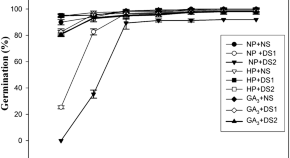Collection
Special Issue: Unravelling the Mechanisms of Stress Response in Crop Plants
- Submission status
- Closed
Environmental conditions are drastically changing, which has a bearing on the global climate change impact, and this is posing new problems to all living creatures including the plant kingdom. As a result, the domains of atmosphere, edaphic, biotic and abiotic impediments are expanding. All these components influence the distribution of natural and man-made vegetation, their survival and propagation.
In agricultural systems, even if conditions tend to be optimized, the effect of abiotic and biotic stresses resulting from changes in the physico-chemical environment is reflected at quantitative and qualitative levels. Thus, there are multiple challenges which affect crop production, including various abiotic stresses (such as high irradiance, salt, drought, flooding, metal toxicity, etc) and biotic stresses (weeds, plant pathogens, etc). Abiotic stress in crops is a major issue in the majority of countries, and the causal agents of biotic stress deprive the hosts of their nutrients leading to death of plants. Plants cope with biotic stresses via defense mechanisms that act against such stresses. The resistance genes against these biotic stresses are present in the plant genome and are encoded in hundreds of genes.
In order to survive under such severe conditions, plants show stress tolerance through acclimation and adaptation mechanisms. Understanding these stress responses at the cell, tissue, or whole organism level of food, feed, fiber, vegetables and ornamental crops is becoming very important. Research using genomics, transcriptomics, metabolomics, lipidomics, proteomics, and incorporating evidence from physiological, biochemical and molecular physiology have contributed to our knowledge of stress responses in crops. Several signaling molecules/agents such as salicylic acid, jasmonic acid, brassinosteroids, nitric oxide, polyamines, etc play key roles in the cross-talk between stress signaling pathways which serve as connecting link between sensing the environmental stresses and creating sustainable physiological and biochemical responses as part of stress tolerance management. The role of plant growth promoting microorganisms and signaling molecules in combating such stresses as well as enhancing nutrient use efficiency is another important aspect of defense mechanisms, which lead to stress tolerance and high yield stability of agricultural crops.
This Special Issue contains articles on crop responses to different abiotic stresses, as well as biotic stimuli during microbial infections/plant pathogen interaction.
Editors
-
Padmanabh Dwivedi
Prof. Padmanabh Dwivedi is the head of the Department of Plant Physiology at Banaras Hindu University, India. He specializes in in vitro propagation of medicinal plants, especially Stevia rebaudiana, using elicitors and signaling agents to enhance production of bioactive compounds. He also studies the effects of these agents on plant stress tolerance and nutrient use efficiency. He has published 134 articles, 56 book chapters and 11 books. He has received many awards and fellowships from India and abroad.
-
Sudhir K. Sopory
Prof Sudhir K Sopory is Emeritus Senior Scientist at the International Center for Genetic Engineering and Biotechnology, New Delhi.
His group has been working to understand plant responses to light and stress conditions. His seminal work was to identify role of neglected glyoxalase pathway in stress and developmental physiology and his group showed that modification of expression of glyoxalase I and II as also III genes can confer tolerance to multiple stresses. His recent work has shown role of melatonin as also prion like proteins in stress memory responses. He has edited 13 books and published over 270 scientific papers.
Articles (52 in this collection)
-
-
Reducing Arsenic Uptake in Cereal Crop Plants with Sugarcane Waste Application: A Comparative Study on the Effects on Physiology, Biochemistry, and Grain Nutrient Status
Authors (first, second and last of 10)
- Ambedkar Gautam
- Nikita Basant
- Shekhar Mallick
- Content type: OriginalPaper
- Published: 01 September 2023
- Pages: 6835 - 6852

-
Metabolomics Analysis Reveals Soybean Node Position Influence on Metabolic Profile of Soybean Seed at Various Developmental Stages
Authors (first, second and last of 13)
- Dennis Takpah
- Muhammad Ahsan Asghar
- Jiang Liu
- Content type: OriginalPaper
- Published: 26 August 2023
- Pages: 6788 - 6800

-
Mobile Signaling Peptides: Secret Molecular Messengers with a Mighty Role in Plant Life
Authors (first, second and last of 11)
- Deepu Pandita
- Javaid Akhter Bhat
- Kadambot H. M. Siddique
- Content type: ReviewPaper
- Open Access
- Published: 26 July 2023
- Pages: 6801 - 6834

-
Impact of Temperature on Centelloside Content, Growth Characters, Physio-morphological Adaptations, and Biochemical Changes in Indian Pennywort (Centella asiatica)
Authors (first, second and last of 8)
- Piyanan Pipatsitee
- Patchara Praseartkul
- Suriyan Cha-um
- Content type: OriginalPaper
- Published: 13 May 2023
- Pages: 6776 - 6787
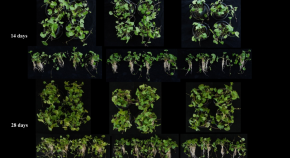
-
Unraveling the Plant Growth-Promoting Mechanisms of Stenotrophomonas sp. CV83 for Drought Stress Tolerance and Growth Enhancement in Chickpea
Authors (first, second and last of 8)
- Anjney Sharma
- Anukool Vaishnav
- Y. K. Bansal
- Content type: OriginalPaper
- Published: 06 May 2023
- Pages: 6760 - 6775

-
GABA and Potassium Modulates Defence Systems, Assimilation of Nitrogen and Carbon, and Yield Traits Under Salt Stress in Wheat
Authors (first, second and last of 4)
- Sarika Kumari
- Faroza Nazir
- M. Iqbal R. Khan
- Content type: OriginalPaper
- Published: 04 May 2023
- Pages: 6721 - 6740
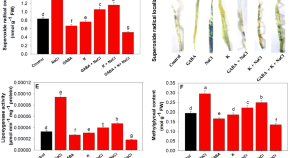
-
“Next-Generation Bioformulations” for Plant Growth Promotion and Stress Mitigation: A Promising Approach for Sustainable Agriculture
Authors
- Annapurna Bhattacharjee
- Shubham Dubey
- Shilpi Sharma
- Content type: ReviewPaper
- Published: 27 April 2023
- Pages: 6741 - 6759

-
Concurrent Overexpression of Rice GS1;1 and GS2 Genes to Enhance the Nitrogen Use Efficiency (NUE) in Transgenic Rice
Authors (first, second and last of 13)
- Shambhu Krishan Lal
- Sahil Mehta
- Malireddy K. Reddy
- Content type: OriginalPaper
- Published: 17 April 2023
- Pages: 6699 - 6720
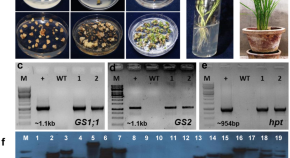
-
Role of Heterotrimeric G-Proteins in Improving Abiotic Stress Tolerance of Crop Plants
Authors
- Parinita Majumdar
- María Daniela Torres Rodríguez
- Sona Pandey
- Content type: ReviewPaper
- Published: 17 March 2023
- Pages: 6681 - 6698
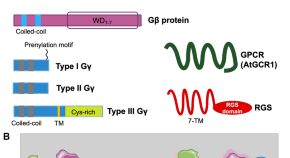
-
Genome-Wide Identification and Analysis of NBS-LRR-Encoding Genes in Mungbean (Vigna radiata L. Wilczek) and Their Expression in Two Wild Non-progenitors Reveal Their Role in MYMIV Resistance
Authors (first, second and last of 8)
- Shalini Purwar
- Chandra Mohan Singh
- Narendra Pratap Singh
- Content type: OriginalPaper
- Published: 09 March 2023
- Pages: 6667 - 6680

-
Bacillus amyloliquefaciens Induces Resistance in Tobacco Against Powdery Mildew Pathogen Erysiphe cichoracearum
Authors (first, second and last of 13)
- Rong Jiao
- Ayesha Ahmed
- Yueqiu He
- Content type: OriginalPaper
- Published: 18 February 2023
- Pages: 6636 - 6651

-
Halotolerant Nodule Rhizobial and Passenger Endophytes Alleviates Salinity Stress in Groundnut (Arachis hypogaea L.)
Authors (first, second and last of 9)
- G. Oviya
- Anandham Rangasamy
- S. Vincent
- Content type: OriginalPaper
- Published: 17 February 2023
- Pages: 6620 - 6635

-
Understanding the Interaction and Potential of Halophytes and Associated Microbiome for Bio-saline Agriculture
Authors (first, second and last of 9)
- Kamlesh K. Meena
- Utkarsh Bitla
- P. Suprasanna
- Content type: ReviewPaper
- Published: 17 February 2023
- Pages: 6601 - 6619

-
Lignin: the Building Block of Defense Responses to Stress in Plants
Authors
- Shalini Yadav
- Debasis Chattopadhyay
- Content type: ReviewPaper
- Published: 10 February 2023
- Pages: 6652 - 6666

-
Transcriptomic Profiling Reveals Key Genes of Halophyte Apocyni Veneti Folium (Apocynum venetum L.) and Regulatory Mechanism of Salt Tolerance
Authors (first, second and last of 11)
- Cuihua Chen
- Chengcheng Wang
- Lian Yin
- Content type: OriginalPaper
- Published: 20 January 2023
- Pages: 6565 - 6584

-
Physiological and Metabolic Changes of Safflower (Carthamus tinctorius L.) Cultivars in Response to Terminal Heat Stress
Authors (first, second and last of 5)
- Farshad Salehi
- Afrasyab Rahnama
- Mansour Ghorbanpour
- Content type: OriginalPaper
- Published: 19 January 2023
- Pages: 6585 - 6600
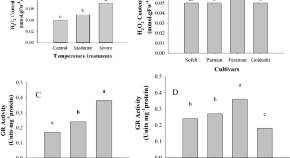
-
Impact of Bio-inoculation with Halotolerant Rhizobacteria on Growth, Physiological, and Hormonal Responses of Durum Wheat Under Salt Stress
Authors (first, second and last of 5)
- Massakib Bekkaye
- Nassima Baha
- Yahia Kaci
- Content type: OriginalPaper
- Published: 10 January 2023
- Pages: 6549 - 6564

-
Helopeltis theivora Responsive Transcriptomic Reprogramming Uncovers Long Non-coding RNAs as Possible Regulators of Primary and Secondary Metabolism in Tea Plant
Authors (first, second and last of 5)
- Kuntala Sarma Bordoloi
- Pooja Moni Baruah
- Niraj Agarwala
- Content type: OriginalPaper
- Published: 31 December 2022
- Pages: 6523 - 6548
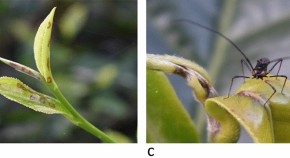
-
Ectopic Expression of Pineapple Actin-Related Protein 6 (AcARP6) Regulates Flowering and Stress Responses in Arabidopsis
Authors (first, second and last of 6)
- Bello Hassan Jakada
- Beenish Fakher
- Yuan Qin
- Content type: OriginalPaper
- Published: 12 December 2022
- Pages: 6461 - 6473

-
Designing Climate-Resilient Crops for Sustainable Agriculture: A Silent Approach
Authors (first, second and last of 4)
- Siddhesh Balkrishna Ghag
- Anshu Alok
- Suprasanna Penna
- Content type: ReviewPaper
- Published: 09 December 2022
- Pages: 6503 - 6522

-
Reconnoitering the Efficacy of Plant Growth Promoting Rhizobacteria in Expediting Phytoremediation Potential of Heavy Metals
Authors (first, second and last of 8)
- Kanika Khanna
- Sukhmeen Kaur Kohli
- Renu Bhardwaj
- Content type: ReviewPaper
- Published: 08 December 2022
- Pages: 6474 - 6502
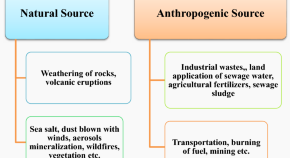
-
Evaluation of Toxicity of Tropospheric Ozone on Tomato (Solanum lycopersicum L.) Cultivars: ROS Production, Defense Strategies and Intraspecific Sensitivity
Authors
- Akanksha Gupta
- Shashi Bhushan Agrawal
- Madhoolika Agrawal
- Content type: OriginalPaper
- Published: 23 November 2022
- Pages: 6444 - 6460

-
Nanoparticle Protein Corona: Understanding NP Biomolecule Interactions for Safe and Informed Nanotechnological Applications Including Stress Alleviation in Plants
Authors
- Satya Prakash
- Ravi Gupta
- Renu Deswal
- Content type: ReviewPaper
- Published: 18 November 2022
- Pages: 6377 - 6396
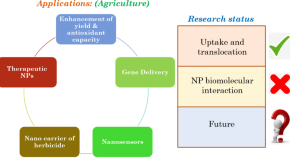
-
Arsenic Contamination in Rice Agro-ecosystems: Mitigation Strategies for Safer Crop Production
Authors (first, second and last of 4)
- Shraddha Singh
- Vishnu D. Rajput
- Tatiana Minkina
- Content type: ReviewPaper
- Published: 16 November 2022
- Pages: 6413 - 6424
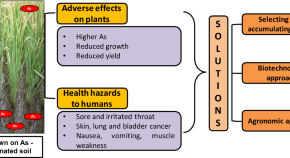
-
Comparative Transcriptome Profiling of Two Contrasting Foxtail Millet Cultivars Provides Insights into Molecular Mechanisms Underlying Dehydration Stress Response
Authors (first, second and last of 6)
- Mehanathan Muthamilarasan
- Bonthala Venkata Suresh
- Manoj Prasad
- Content type: OriginalPaper
- Published: 15 November 2022
- Pages: 6425 - 6443
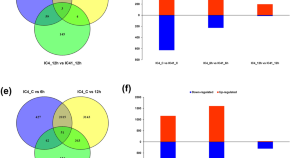
-
Trichoderma-Induced Promotion of Nitrogen Use Efficiency is Mediated by Nitric Oxide Generation Leading to Improved Growth and Yield in Pea (Pisum sativum L.) Plants
Authors
- Bansh Narayan Singh
- Padmanabh Dwivedi
- Content type: OriginalPaper
- Published: 05 November 2022
- Pages: 6397 - 6412

-
Physiological, Biochemical, and Gene Expression Responses of Sugarcane Under Cold, Drought and Salt Stresses
Authors (first, second and last of 8)
- V. Kaura
- P. K. Malhotra
- G. Kaur
- Content type: OriginalPaper
- Published: 01 November 2022
- Pages: 6367 - 6376

-
Exogenous Melatonin Counteracts Salinity and Cadmium Stress via Photosynthetic Machinery and Antioxidant Modulation in Solanum lycopersicum L
Authors (first, second and last of 10)
- Kritika Bhardwaj
- Meenakshi Raina
- Deepak Kumar
- Content type: OriginalPaper
- Published: 22 October 2022
- Pages: 6332 - 6348

-
Climate-Resilience Maize: Heat stress, Signaling, and Molecular interventions
Authors (first, second and last of 10)
- Ajay Kumar Chandra
- Anjali Joshi
- Vishal Dinkar
- Content type: ReviewPaper
- Published: 21 October 2022
- Pages: 6349 - 6366

-
miRNA Regulatory Networks Underlying the Root–Leaf Synergism in Salt Tolerant Pokkali Rice
Authors (first, second and last of 6)
- Kavita Goswami
- Deepti Mittal
- Neeti Sanan-Mishra
- Content type: OriginalPaper
- Published: 13 October 2022
- Pages: 6183 - 6201

-
High Salinity Stimulates the Adaptive Response to Potassium Deficiency Through the Antioxidant and the NADPH-Generating Systems in the Roots and Leaves of the Halophyte Cakile maritima
Authors
- Hayet Houmani
- José M. Palma
- Francisco J. Corpas
- Content type: OriginalPaper
- Open Access
- Published: 12 October 2022
- Pages: 6286 - 6306

-
Nocturnal Red Light Application Modulated the Fumonisin B1-Induced Changes in Glutathione Transferases of Different Wheat Cultivars
Authors (first, second and last of 6)
- Alina Pelsőczi
- Edit Horváth
- Ágnes Gallé
- Content type: OriginalPaper
- Open Access
- Published: 12 October 2022
- Pages: 6319 - 6331

-
Revisiting the Critical Role of ROS and RNS in Plant Defense
Authors
- Krishna Kumar Rai
- Content type: ReviewPaper
- Published: 10 October 2022
- Pages: 6202 - 6227
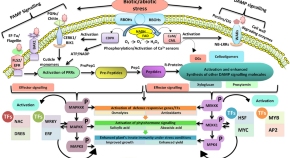
-
Understanding the Physiological Mechanism of Heme Oxygenase for Enhanced Tolerance and Phytoremediation of Cd2+ in Eruca sativa: Co-ordinated Function of Antioxidant Defense System
Authors
- Lovely Mahawar
- Gyan Singh Shekhawat
- Content type: OriginalPaper
- Published: 08 October 2022
- Pages: 6307 - 6318
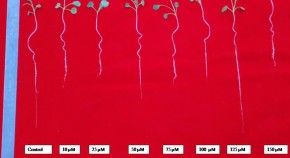
-
Melatonin–Nitric Oxide Interaction Modulates Catalase Activity and Hydrogen Peroxide Homeostasis in Sunflower Seedling Cotyledons Accompanying NaCl Stress
Authors
- Harmeet Kaur
- Satish C. Bhatla
- Content type: OriginalPaper
- Published: 05 October 2022
- Pages: 6261 - 6272

-
Mitigation of Water-Deficit Stress, Physio-morphological Adaptation, and Elevation of Andrographolide in Andrographis paniculata using Foliar Glycine Betaine
Authors (first, second and last of 7)
- Daonapa Chungloo
- Rujira Tisarum
- Suriyan Cha-um
- Content type: OriginalPaper
- Published: 03 October 2022
- Pages: 6273 - 6285

-
Chickpea Defensin Gene Family: Promising Candidates for Resistance Against Soil-Borne Chickpea Fungal Pathogens
Authors (first, second and last of 10)
- Rahul B. Nitnavare
- Arunima Pothana
- Pooja Bhatnagar-Mathur
- Content type: OriginalPaper
- Published: 03 October 2022
- Pages: 6244 - 6260

-
Seed Priming and Foliar Application of Chitosan Ameliorate Drought Stress Responses in Mungbean Genotypes Through Modulation of Morpho-physiological Attributes and Increased Antioxidative Defense Mechanism
Authors (first, second and last of 4)
- Akash Hidangmayum
- Padmanabh Dwivedi
- Sudhir Kumar Upadhyay
- Content type: OriginalPaper
- Published: 29 September 2022
- Pages: 6137 - 6154

-
Role of Root Hydraulics in Plant Drought Tolerance
Authors (first, second and last of 8)
- Soheyla Mohammadi Alagoz
- Noreen Zahra
- Muhammad Farooq
- Content type: ReviewPaper
- Published: 23 September 2022
- Pages: 6228 - 6243

-
Ascorbate and Hydrogen Peroxide Modify Metabolite Profile of Wheat Differently
Authors (first, second and last of 11)
- Muhammad Ahsan Asghar
- Eszter Balogh
- Gábor Kocsy
- Content type: OriginalPaper
- Open Access
- Published: 21 September 2022
- Pages: 6155 - 6170
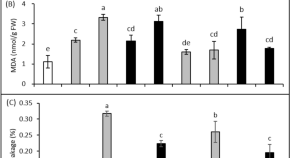
-
Application of Thiourea Ameliorates Stress and Reduces Accumulation of Arsenic in Wheat (Triticum aestivum L.) Plants Grown in Contaminated Field
Authors (first, second and last of 4)
- Anurakti Shukla
- Saurabh Kumar Pathak
- Sudhakar Srivastava
- Content type: OriginalPaper
- Published: 21 September 2022
- Pages: 6171 - 6182

-
Gene Pyramiding in Transgenic Plant Development: Approaches and Challenges
Authors (first, second and last of 5)
- Ruchika Rajput
- Jogindra Naik
- Ashutosh Pandey
- Content type: ReviewPaper
- Published: 14 September 2022
- Pages: 6038 - 6056

-
Identification, Genomic Organization, and Comprehensive Expression Analysis Reveals the Implication of Cicer arietinum SKP1-like Genes in Abiotic Stress
Authors
- Vishal Varshney
- Abhijit Hazra
- Manoj Majee
- Content type: OriginalPaper
- Published: 09 September 2022
- Pages: 6074 - 6090
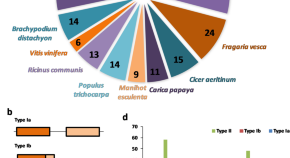
-
Fluoride Toxicity Imposes Differential Reprogramming of the Representative Intermediates and Enzymes Belonging to Nitrogen Metabolism in Two indica Rice Varieties, Varying in their Pattern of Fluoride Stress Response
Authors
- Ankur Singh
- Aryadeep Roychoudhury
- Content type: OriginalPaper
- Published: 09 September 2022
- Pages: 6091 - 6103

-
Dealing with Environmental Fluctuations: Diversity of Potassium Uptake Systems Across the Three Domains of Life
Authors
- Divya Rajagopal
- Sudhir K. Sopory
- M. K. Mathew
- Content type: ReviewPaper
- Published: 07 September 2022
- Pages: 6104 - 6136
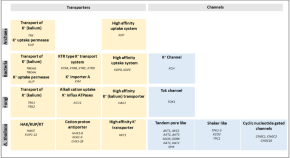
-
Protease Inhibitors: An Induced Plant Defense Mechanism Against Herbivores
Authors (first, second and last of 8)
- Pratap A. Divekar
- Vijaya Rani
- Guru-Pirasanna-Pandi Govindharaj
- Content type: OriginalPaper
- Published: 28 August 2022
- Pages: 6057 - 6073

-
Assessment of Sclerotinia Stem and Leaf Rot Resistance and its Association with Physical Strength Attributes in Brassicaceae with Special Emphasis on Brassica Juncea
Authors (first, second and last of 13)
- Manjeet Singh
- Ram Avtar
- Vivek K. Singh
- Content type: OriginalPaper
- Published: 27 August 2022
- Pages: 6021 - 6037

-
Comparative Genomic Analysis of GARP Transcription Factor Family in Legumes and Identification of Stress-Responsive Candidate Genes
Authors
- Ritu Singh
- Ashutosh Pandey
- Praveen Kumar Verma
- Content type: OriginalPaper
- Published: 09 August 2022
- Pages: 6005 - 6020

-
Gibberellic Acid Priming Improved Rapeseed Drought Tolerance by Modulating Root Morphology, ROS Homeostasis, and Chloroplast Autophagy
Authors (first, second and last of 5)
- Kangkang Zhang
- Zaid Khan
- Liyong Hu
- Content type: OriginalPaper
- Published: 06 August 2022
- Pages: 5977 - 5990
